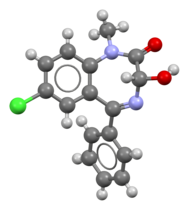
Back تيمازيبام Arabic تمازپام AZB তেমাজিপাম Bengali/Bangla Temazepam Czech Temasepam Welsh Temazepam German Temazepam Spanish تمازپام Persian Tematsepaami Finnish Témazépam French
 | |
 | |
| Clinical data | |
|---|---|
| Trade names | Restoril, Normison, Nortem, others |
| Other names | 3-Hydroxydiazepam |
| AHFS/Drugs.com | Monograph |
| MedlinePlus | a684003 |
| License data | |
| Pregnancy category |
|
| Dependence liability | High[1][unreliable medical source?] |
| Routes of administration | By mouth |
| Drug class | Benzodiazepine |
| ATC code | |
| Legal status | |
| Legal status |
|
| Pharmacokinetic data | |
| Bioavailability | 96% |
| Metabolism | Liver |
| Elimination half-life | 8–20 hours |
| Duration of action | ≤8 hours[7] |
| Excretion | Kidney |
| Identifiers | |
| |
| CAS Number | |
| PubChem CID | |
| IUPHAR/BPS | |
| DrugBank | |
| ChemSpider | |
| UNII | |
| KEGG | |
| ChEMBL | |
| CompTox Dashboard (EPA) | |
| ECHA InfoCard | 100.011.535 |
| Chemical and physical data | |
| Formula | C16H13ClN2O2 |
| Molar mass | 300.74 g·mol−1 |
| 3D model (JSmol) | |
| |
| |
| | |
Temazepam, sold under the brand name Restoril among others, is a medication of the benzodiazepine class which is generally used to treat severe or debilitating insomnia.[8] It is taken by mouth.[8] Temazepam is rapidly absorbed, and significant hypnotic and anxiolytic effects begin in less than 30 minutes and can last for up to eight hours.[9][7] Prescriptions for hypnotics such as temazepam have seen a dramatic decrease since 2010, while anxiolytics such as alprazolam, clonazepam, and lorazepam have increased or remained stable.[10] Temazepam and similar hypnotics, such as triazolam (Halcion) are generally reserved for severe and debilitating insomnia. They have largely been replaced by z-drugs (zopiclone, zolpidem) and atypical antidepressants (trazodone, mirtazapine) as first line treatment for insomnia.[8]
Common side effects include drowsiness, motor and cognitive impairment, lethargy, confusion, euphoria, and dizziness.[8] Serious side effects may include hallucinations, hypotension, respiratory depression, abuse, anaphylaxis, and suicide.[8] Use is generally not recommended together with alcohol or opioids.[8] If the dose is rapidly decreased withdrawal may occur.[8] Use during pregnancy or breastfeeding is not recommended.[11] Temazepam is a short-acting benzodiazepine and hypnotic.[8][7] It works by affecting GABA within the brain.[8]
Temazepam was patented in 1962 and came into medical use in 1969.[12] It is available as a generic medication.[13] In 2021, it was the 208th most commonly prescribed medication in the United States, with more than 2 million prescriptions.[14][15]
- ^ "Temazepam". www.drugbank.ca. Retrieved 26 June 2019.
- ^ Temaze temazepam 10mg tablet bottle (63863)
- ^ Anvisa (31 March 2023). "RDC Nº 784 - Listas de Substâncias Entorpecentes, Psicotrópicas, Precursoras e Outras sob Controle Especial" [Collegiate Board Resolution No. 784 - Lists of Narcotic, Psychotropic, Precursor, and Other Substances under Special Control] (in Brazilian Portuguese). Diário Oficial da União (published 4 April 2023). Archived from the original on 3 August 2023. Retrieved 16 August 2023.
- ^ "Temazepam Product information". Health Canada. 25 April 2012. Retrieved 20 October 2022.
- ^ "Temazepam 10mg/5ml Oral Solution - Summary of Product Characteristics (SmPC)". (emc). 9 April 2021. Retrieved 20 October 2022.
- ^ "Restoril- temazepam capsule". DailyMed. 11 February 2021. Retrieved 20 October 2022.
- ^ a b c Collins SR (2015). Pharmacology and the Nursing Process. Elsevier Health Sciences. p. 193. ISBN 9780323358286.
- ^ a b c d e f g h i "Temazepam Monograph for Professionals". Drugs.com. American Society of Health-System Pharmacists. Retrieved 8 April 2019.
- ^ Cite error: The named reference
monographwas invoked but never defined (see the help page). - ^ Breen CL, Degenhardt LJ, Bruno RB, Roxburgh AD, Jenkinson R (September 2004). "The effects of restricting publicly subsidised temazepam capsules on benzodiazepine use among injecting drug users in Australia". The Medical Journal of Australia. 181 (6): 300–304. doi:10.5694/j.1326-5377.2004.tb06293.x. PMID 15377238. S2CID 6870892.
- ^ "Temazepam (Restoril) Use During Pregnancy". Drugs.com. Retrieved 8 April 2019.
- ^ Fischer J, Ganellin CR (2006). Analogue-based Drug Discovery. John Wiley & Sons. p. 537. ISBN 9783527607495.
- ^ British national formulary: BNF 76 (76 ed.). Pharmaceutical Press. 2018. p. 481. ISBN 9780857113382.
- ^ "The Top 300 of 2021". ClinCalc. Archived from the original on 15 January 2024. Retrieved 14 January 2024.
- ^ "Temazepam - Drug Usage Statistics". ClinCalc. Retrieved 14 January 2024.